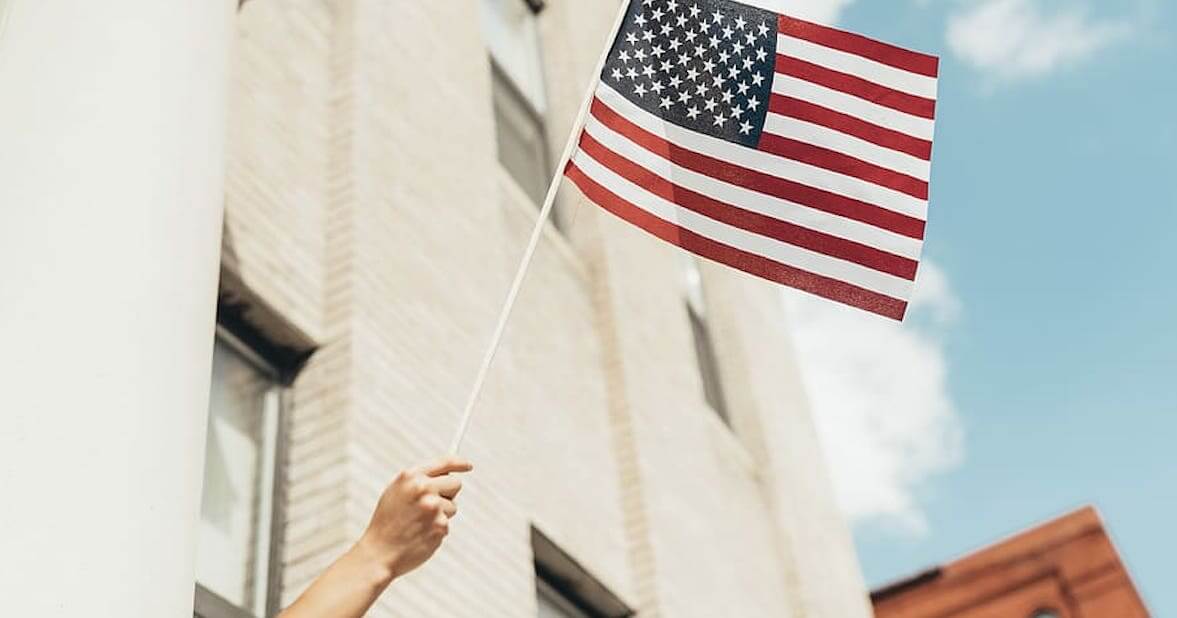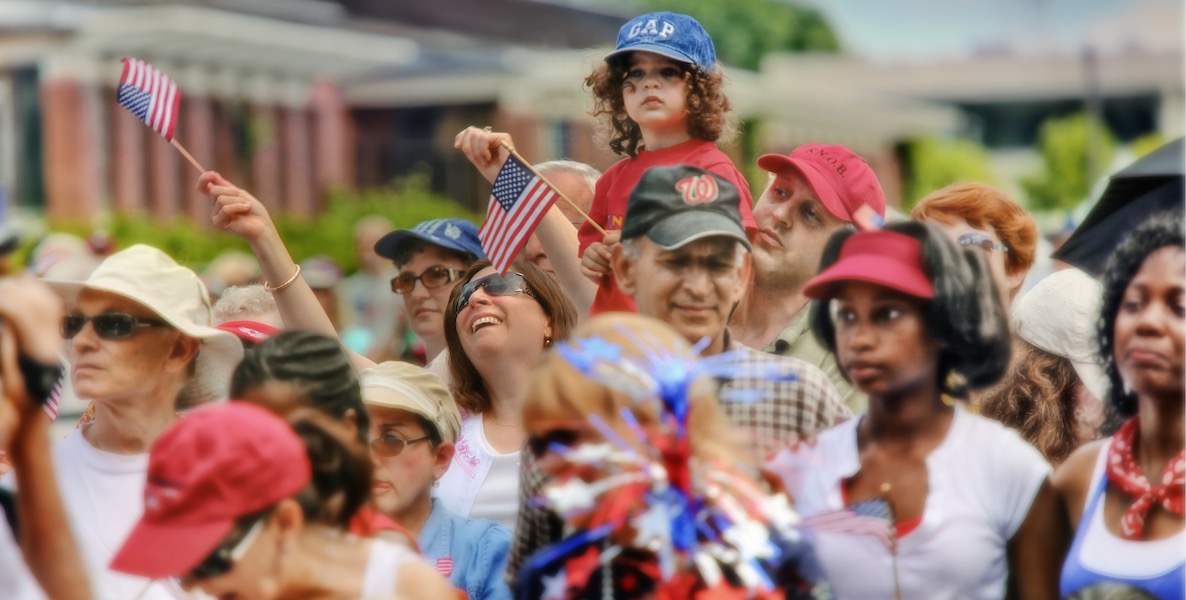On this day in 1852, abolitionist Frederick Douglass delivered, to a Rochester, New York, audience, a scathing critique of the hypocrisy of celebrating “Independence Day” when millions of men, women and children were enslaved in the American South.
“Your high independence only reveals the immeasurable distance between us,” Douglass said, after wondering aloud why he was asked to speak about a day that didn’t include him. “The blessings in which you, this day, rejoice, are not enjoyed in common. The rich inheritance of justice, liberty, prosperity and independence, bequeathed by your fathers, is shared by you, not by me. The sunlight that brought light and healing to you, has brought stripes and death to me.”
The end of the Civil War — and, Juneteenth, after that — saw the end of slavery in America. But the sentiments Douglass expressed resonate still with many Americans. So do the words of Susan B. Anthony in 1876, Eleanor Roosevelt in 1959, Martin Luther King Jr. in 1965, Ronald Reagan in 1981 and Barack Obama in 2013.
“I leave off where I began,” Douglass said, “with hope. While drawing encouragement from ‘the Declaration of Independence,’ the great principles it contains, and the genius of American Institutions, my spirit is also cheered by the obvious tendencies of the age.”
The 4th of July has long marked more than just the anniversary of a revolution — it’s offered a moment to reflect on what makes America great and not so great, what we share, what we’ve lost, and how we can work together to be our best selves as citizens and compatriots.
Towards the end of his speech, Douglass acknowledged the possibilities of change, of greatness for America. It’s a greatness for which we still (and will always) strive.
“I leave off where I began,” Douglass said, “with hope. While drawing encouragement from ‘the Declaration of Independence,’ the great principles it contains, and the genius of American Institutions, my spirit is also cheered by the obvious tendencies of the age.”
Here, some excerpts from Independence Day exhortations throughout our 246-year history, and how we can make the best America for all of us.
SKIP TO THE SPEECHES 👇
- Frederick Douglass
- Susan B. Anthony
- Eleanor Roosevelt
- Martin Luther King Jr.
- Ronald Reagan
- Barack Obama
![]()
Frederick Douglas 4th of July speech, 1852
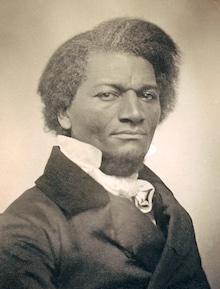
“This Fourth of July is yours, not mine. You may rejoice, I must mourn. To drag a man in fetters into the grand illuminated temple of liberty, and call upon him to join you in joyous anthems, were inhuman mockery and sacrilegious irony. Do you mean, citizens, to mock me, by asking me to speak today?
If so, there is a parallel to your conduct. And let me warn you that it is dangerous to copy the example of a nation whose crimes, towering up to heaven, were thrown down by the breath of the Almighty, burying that nation in irrevocable ruin! I can today take up the plaintive lament of a peeled and woe-smitten people!
Fellow citizens, above your national, tumultuous joy, I hear the mournful wail of millions! whose chains, heavy and grievous yesterday, are, today, rendered more intolerable by the jubilee shouts that reach them.
If I do forget, if I do not faithfully remember those bleeding children of sorrow this day, “may my right hand forget her cunning, and may my tongue cleave to the roof of my mouth!” To forget them, to pass lightly over their wrongs, and to chime in with the popular theme, would be treason most scandalous and shocking, and would make me a reproach before God and the world.
My subject, then, fellow citizens, is American slavery. I shall see this day and its popular characteristics from the slave’s point of view. Standing there identified with the American bondman, making his wrongs mine, I do not hesitate to declare, with all my soul, that the character and conduct of this nation never looked blacker to me than on this 4th of July!
Whether we turn to the declarations of the past, or to the professions of the present, the conduct of the nation seems equally hideous and revolting. America is false to the past, false to the present, and solemnly binds herself to be false to the future.
Fellow citizens, above your national, tumultuous joy, I hear the mournful wail of millions! whose chains, heavy and grievous yesterday, are, today, rendered more intolerable by the jubilee shouts that reach them.
Standing with God and the crushed and bleeding slave on this occasion, I will, in the name of humanity which is outraged, in the name of liberty which is fettered, in the name of the constitution and the Bible which are disregarded and trampled upon, dare to call in question and to denounce, with all the emphasis I can command, everything that serves to perpetuate slavery—the great sin and shame of America!
“I will not equivocate; I will not excuse”; I will use the severest language I can command; and yet not one word shall escape me that any man, whose judgment is not blinded by prejudice, or who is not at heart a slaveholder, shall not confess to be right and just.
At a time like this, scorching irony, not convincing argument, is needed. O! Had I the ability, and could reach the nation’s ear, I would, today, pour out a fiery stream of biting ridicule, blasting reproach, withering sarcasm, and stern rebuke. For it is not light that is needed, but fire; it is not the gentle shower, but thunder. We need the storm, the whirlwind, and the earthquake.
The feeling of the nation must be quickened; the conscience of the nation must be roused; the propriety of the nation must be startled; the hypocrisy of the nation must be exposed; and its crimes against God and man must be proclaimed and denounced.
What, to the American slave, is your 4th of July? I answer; a day that reveals to him, more than all other days in the year, the gross injustice and cruelty to which he is the constant victim.
To him, your celebration is a sham; your boasted liberty, an unholy license; your national greatness, swelling vanity; your sounds of rejoicing are empty and heartless; your denunciation of tyrants, brass fronted impudence; your shouts of liberty and equality, hollow mockery; your prayers and hymns, your sermons and thanksgivings, with all your religious parade and solemnity, are, to Him, mere bombast, fraud, deception, impiety, and hypocrisy—a thin veil to cover up crimes which would disgrace a nation of savages.
There is not a nation on the earth guilty of practices more shocking and bloody than are the people of the United States, at this very hour.”
Read the full speech, titled “The Meaning of July Fourth for the Negro”
![]()
Susan B. Anthony on women’s rights, 1876
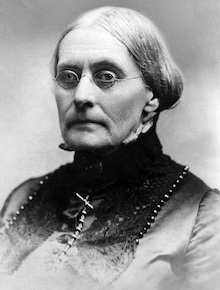
“We do rejoice in the success, thus far, of our experiment of self-government. Our faith is firm and unwavering in the broad principles of human rights proclaimed in 1776, not only as abstract truths, but as the corner stones of a republic. Yet we cannot forget, even in this glad hour, that while all men of every race, and clime, and condition, have been invested with the full rights of citizenship under our hospitable flag, all women still suffer the degradation of disfranchisement …
These articles of impeachment against our rulers we now submit to the impartial judgment of the people. To all these wrongs and oppressions woman has not submitted in silence and resignation.
From the beginning of the century, when Abigail Adams, the wife of one president and mother of another, said, “We will not hold ourselves bound to obey laws in which we have no voice or representation,” until now, woman’s discontent has been steadily increasing, culminating nearly thirty years ago in a simultaneous movement among the women of the nation, demanding the right of suffrage.
In making our just demands, a higher motive than the pride of sex inspires us; we feel that national safety and stability depend on the complete recognition of the broad principles of our government.
Woman’s discontent has been steadily increasing, culminating nearly thirty years ago in a simultaneous movement among the women of the nation, demanding the right of suffrage.
And now, at the close of a hundred years, as the hour-hand of the great clock that marks the centuries points to 1876, we declare our faith in the principles of self-government; our full equality with man in natural rights; that woman was made first for her own happiness, with the absolute right to herself—to all the opportunities and advantages life affords for her complete development; and we deny that dogma of the centuries, incorporated in the codes of all nations — that woman was made for man — her best interests, in all cases, to be sacrificed to his will.
We ask of our rulers, at this hour, no special favors, no special privileges, no special legislation. We ask justice, we ask equality, we ask that all the civil and political rights that belong to citizens of the United States, be guaranteed to us and our daughters forever.”
Read the entire document, entitled “Declaration of Rights of the Women of the United States,” written by Anthony, Matilda Joslyn Gage and Elizabeth Cady Stanton on behalf of National Women’s Suffrage Association
![]()
Eleanor Roosevelt, in a “My Day” column, 1959
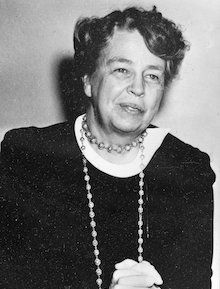
“We should be reminded that the founding fathers were, for the most part, very young, and that it took great courage to face the conditions of their day. Their actions gave hope to people all over the world, which was somewhat smaller than it is today.
I think that if it became our habit to think of the Declaration of Independence and our country as it existed in 1776, we would face today’s problems with more courage. There are many ways in which today we could express our patriotism and the world in which we live.
In Westchester County, New York, one community has a slogan for the Fourth of July: “Independence — everyone is declaring it. We are sharing it.” They are using the day to raise funds for the people of Korea, thereby sharing some of our independence.
Other communities might make sure that they have no citizens who do not share fully in the independence promised every citizen of this nation. This might mean taking a close look at the local employment conditions, for no one who is out of a job can be really independent or has a job that doesn’t pay a living wage. No one can be really independent who suffers any civil disability or who does not receive equal justice before the law.
But all these things can still exist in our country if we forget about the Declaration of Independence and the fact that we must implement it every day of our lives to make its promises the reality of our world today.
The Fourth of July is not just a day for having a good time. It is a day when we urge our citizens to remember that in this country we paint the picture of democracy for the whole world to see.”
![]()
Martin Luther King Jr. on the American dream, 1965
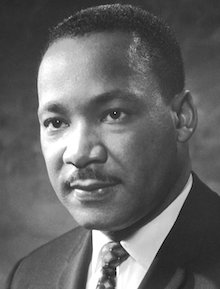
“As we struggle to realize the American dream, let us realize that we do not struggle alone. Even though there are the difficult days ahead, even though before the victory’s won, somebody else will have to get scarred up, somebody else will have to go to jail, maybe someone will have to face physical death.
For the victories won, some will be misunderstood, called bad names, be dismissed as dangerous rabble-rousers and agitators. Even in the midst of that, the struggle must go on. Knowing that the victory can be won because the odds of the moral universe is long, but it bends toward justice.
And I am convinced that that is something in this universe, which justifies Carlyle in saying, “No lie can live forever.” There is something in the very court of the cosmos which justifies William Cullen Bryant in saying “Truth, cursed to earth, will rise again.” There is something in this universe which justifies James Russell Lowell, in saying, “Truth, forever on the scaffold, wrong, forever on the throne.”
Yet that scaffold sways the future. And so with this faith in the future, we will be able to adjourn the counsels of the staff, rise from the fatigue of darkness, to the buoyancy of hope. And we will be able to bring into being this new society and realize the American dream.
This will be the day when all of the chosen black men and white men, Jews and gentiles, Protestants and Catholics, will be able to join hands and sing in the words of the old Negro spiritual, ‘Free at last, free at last, thank God almighty, we are free at last.’”
![]()
Ronald Reagan 4th of July speech, 1981
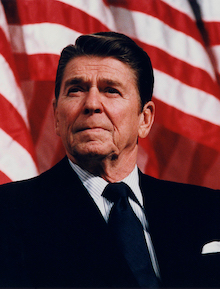
“July Fourth is the birthday of our nation. I believed as a boy, and believe even more today, that it is the birthday of the greatest nation on earth.
There is a legend about the day of our nation’s birth in the little hall in Philadelphia, a day on which debate had raged for hours. The men gathered there were honorable men hard-pressed by a king who had flouted the very laws they were willing to obey. Even so, to sign the Declaration of Independence was such an irretrievable act that the walls resounded with the words “treason, the gallows, the headsman’s ax,” and the issue remained in doubt.
The legend says that at that point a man rose and spoke. He is described as not a young man, but one who had to summon all his energy for an impassioned plea. He cited the grievances that had brought them to this moment and finally, his voice falling, he said, “They may turn every tree into a gallows, every hole into a grave, and yet the words of that parchment can never die. To the mechanic in the workshop, they will speak hope; to the slave in the mines, freedom. Sign that parchment. Sign if the next moment the noose is around your neck, for that parchment will be the textbook of freedom, the Bible of the rights of man forever.”
He fell back exhausted. The 56 delegates, swept up by his eloquence, rushed forward and signed that document destined to be as immortal as a work of man can be. When they turned to thank him for his timely oratory, he was not to be found, nor could any be found who knew who he was or how he had come in or gone out through the locked and guarded doors.
Oh, there have been revolutions before and since ours. But those revolutions simply exchanged one set of rules for another. Ours was a revolution that changed the very concept of government.
In recent years, however, I’ve come to think of that day as more than just the birthday of a nation. It also commemorates the only true philosophical revolution in all history.
Oh, there have been revolutions before and since ours. But those revolutions simply exchanged one set of rules for another. Ours was a revolution that changed the very concept of government.
Let the Fourth of July always be a reminder that here in this land, for the first time, it was decided that man is born with certain God-given rights; that government is only a convenience created and managed by the people, with no powers of its own except those voluntarily granted to it by the people.
We sometimes forget that great truth, and we never should.”
Read the full speech, titled “What July Fourth Means to Me”
![]()
Barack Obama 4th of July speech, 2013
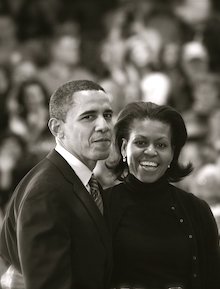
“On July 4th, 1776, a small band of patriots declared that we were a people created equal — free to think and worship and live as we please. It was a declaration heard around the world — that we were no longer colonists, we were Americans, and our destiny would not be determined for us; it would be determined by us.
It was a bold and tremendously brave thing to do. It was also nearly unthinkable. At that time, kings and princes and emperors ruled the world. But those patriots were certain that a better way was possible. And to achieve it—to win their freedom—they were willing to lay it all on the line. Their lives. Their fortunes. Their sacred honor.
They fought a revolution. Few would have bet on our side to win. But for the first of many times to come, America proved the doubters wrong.
And now, 237 years later, the United States — this improbable nation — is the greatest in the world. A land of liberty and opportunity. A global defender of peace and freedom. A beacon of hope to people everywhere who cherish those ideals.
Generations of Americans made our country what it is today—farmers and teachers, engineers and laborers, entrepreneurs and elected leaders—people from all walks of life, from all parts of the world, all pulling in the same direction.
And now we, the people, must make their task our own—to live up to the words of that Declaration of Independence, and secure liberty and opportunity for our own children, and for future generations.”
Read and / or watch the full speech
![]()



